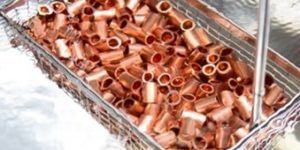MULTI-TASKING CENTER OFFERS AUTO INDUSTRY HIGH-VOLUME THROUGHPUT
Mazak?s Multi-Tasking Hyper Quadrex 100MSY is one solution the automotive industry can look to as it continues to improve efficiency and productivity during one of the most trying times in its history. The HQR 100MSY offers high-productivity, high-rigidity and high-efficiency turning and machining.
Posted: March 25, 2009
Mazak's Multi-Tasking Hyper Quadrex 100MSY is one solution the automotive industry can look to as it continues to improve efficiency and productivity during one of the most trying times in its history. The HQR 100MSY offers high-productivity, high-rigidity and high-efficiency turning and machining.
The HQR 100MSY features two horizontally opposed spindles, each with a 6 in through hole chuck. The turning spindles each generate 15 hp and 6,000 rpm. The machine also features upper and lower 12-position tool turrets, both capable of traversing in the Y-axis for off-center machining operations. Fixed and live tools, powered by 6,000 rpm, 7.5 Hp spindles, can be mounted on both turrets. In the twin turrets and twin spindle configuration, shops can gain innovative process opportunities. The main and secondary spindles can operate together or separately, allowing a single part to be machined on all surfaces through a coordinated ?hand-off? between spindles, or two different parts can be machined simultaneously on one machine.
Since the twin turrets can operate independently or together on the same part, opportunities abound for machining of two features simultaneously or balanced machining strategies. In balanced cutting, two tools work together on the same feature such as rough and finish turning, rough and finish milling, or opposed feature drilling, tapping, or boring utilizing the Y-axes. In cases where the part configuration permits, balanced machining can remove up to 25 percent of the cycle time. Automation opportunities are plentiful with Hyper Quadrex 100MSY, allowing long periods of unmanned operation over breaks, nights and weekends. In addition to a coordinated ?hand-off? between spindles, bar feeders, automatic part unloaders are available as well as robotic machine tending.














